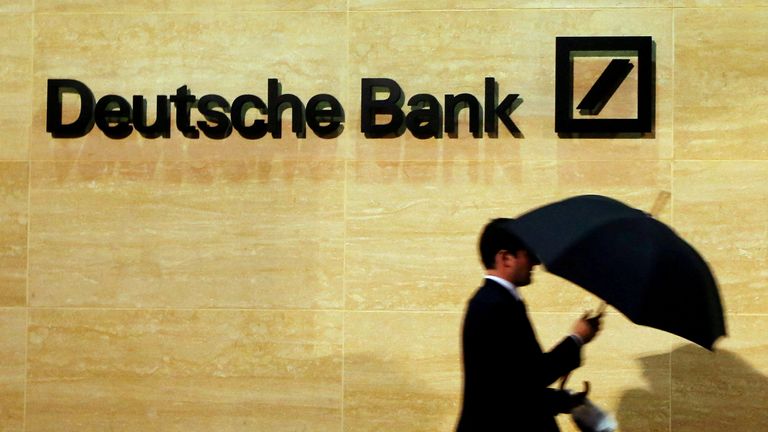Deutsche float plan for fund management arm with chequered UK record
The German lender's chief executive has unveiled plans to sell off a chunk of the division, which has a colourful City record.
Tuesday 13 March 2018 12:27, UK
John Cryan, the Briton in charge of Deutsche Bank, has made another important decision in his attempt to revive the fortunes of Germany's biggest lender.
Mr Cryan, chief executive since July 2015, is to float off the bank's fund management arm as a separate business.
The flotation of DWS, the name to which the old Deutsche Asset Management was rebranded in December, will be one of the biggest in Europe this year.
The company, which has some €700bn under management, is one of the world's biggest fund managers and will be valued at up to €7.2bn.
It is a business with fortunes closely tied to the UK over the years.
It employs 500 people in the UK and hundreds of thousands of Britons will have some of their retirement savings managed by the company.
Under the DWS brand, it was a shirt sponsor for Aston Villa, then a Premier League club, from 2004 to 2006, a nod to the vast number of employees it had in Birmingham in those days.
And among its former employees include Philip May, husband of the Prime Minister.
:: Deutsche Bank: Why we should all be deeply concerned
But its experiences in this country have, at times, been chequered.
Deutsche Asset Management moved into Britain in a big way when, in November 1989, its parent company snapped up the venerable old merchant bank Morgan Grenfell for £950m.
The deal immediately catapulted Deutsche into the first division of City fund managers since, at the time of the deal, the old Morgan Grenfell Asset Management (MGAM) had £17bn under management - a vast sum at the time.
For a while, all went well, with Morgan Grenfell reporting record profits in 1994 and MGAM's funds under management surging to £28bn.
Among the firm's biggest stars was Peter Young, whose spectacular investment performance and expertise in technology stocks had resulted in more than 90,000 Britons investing in his three funds, usually at the urging of financial advisers.
However, in September 1996, dealings in the funds were suspended along with Mr Young himself.
It swiftly emerged that large portions of the funds had been invested in unquoted businesses, many of them in Scandinavia, prompting Deutsche to inject £200m into the funds to shore up confidence.
When dealing in the funds was permitted once again, investors started heading for the exit, obliging the bank to put in more money.
It later agreed to compensate investors for any loss to the tune of around £200m.
The whole affair cost Deutsche Bank around £450m.
The compensation scheme was honourable behaviour from Deutsche, ensuring no investors lost out as a result, but it was a huge blow to the prestige of the business.
Five directors of MGAM, including Keith Percy, its chief executive, were shown the door, the firm was fined a then record sum of £2m and an investigation by the Serious Fraud Office followed.
Mr Young was subsequently charged with fraud and arrived at court with shoulder-length hair, wearing lipstick, a skirt and answering to the name of Beth. He was ruled unfit to stand trial.
By then, the firm had been rocked by a second crisis, after Nicola Horlick, the £1m-a-year head of MGAM's institutional business, was suspended amid allegations she was trying to defect to a rival firm and take 20 colleagues with her.
Followed by a posse of reporters, photographers and a TV crew, she flew to Frankfurt for a showdown with the bank's bosses, but ultimately left the business.
Two years later, the old Morgan Grenfell Asset Management name was killed off, replaced by Deutsche Asset Management.
The retail fund management arm of the business - DWS Investments UK - was sold to Aberdeen Asset Management in 2005.
The Villa shirt sponsorship came to an end shortly afterwards and, since then, DWS has concentrated on managing institutional money rather than on behalf of retail investors.
Compared with all that, completing the successful flotation of DWS should be a doddle, although Mr Cryan, who was born in Harrogate and grew up in Sunderland, will inevitably face questions about what it will do with the €1.8bn or so it is expected to reap from selling a quarter or so of the business to outside investors.





